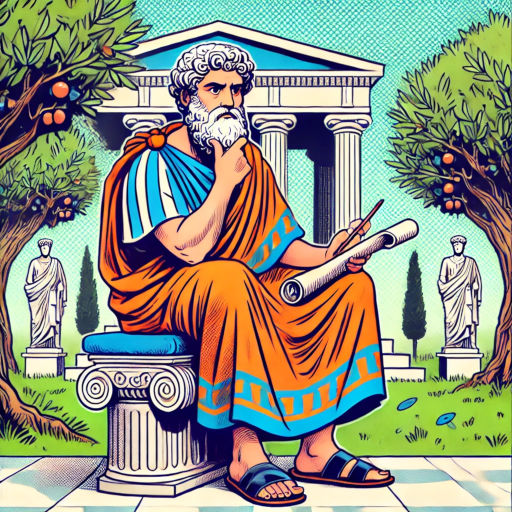What Is Stoicism?
Have you ever found yourself worrying about things you can’t control, like unexpected challenges at work, a friend’s opinion of you, or the weather on a big day? If you have, you’re not alone. These worries can be devastating, consuming your thoughts, draining your energy, and disrupting your daily life. Worse, they’re often unproductive, as they don’t solve the problems or bring you closer to peace.

This is where Stoicism, an ancient philosophy founded in Greece by Zeno of Citium, offers a practical way to address these concerns and improve your well-being. Stoicism teaches that with careful consideration and reflection, you can recognize that many of these worries are unnecessary and stem from logical fallacies. For example, fearing someone’s judgment doesn’t change who you are, and dreading tomorrow’s weather doesn’t alter the forecast. When you examine these fears logically, you begin to see their futility.
Through Stoic practices, you can teach yourself to liberate your mind from these worries. By focusing only on what is within your control—your actions, thoughts, and reactions—you can find freedom from the weight of these anxieties and live a more peaceful, productive, and fulfilling life. Stoicism isn’t about suppressing emotions; it’s about empowering yourself to respond to life’s challenges with clarity and calm.
Why Is Stoicism Still Relevant Today?
Stoicism was born out of adversity. Its founder, Zeno of Citium, came to philosophy after losing everything in a shipwreck. Stranded in Athens, Zeno discovered solace and purpose through the teachings of ancient philosophers, eventually developing Stoicism—a practical philosophy that became one of the most prominent in the ancient world. It was embraced by thinkers, leaders, and even emperors, guiding them through the challenges of life with wisdom and resilience.
But why does Stoicism still matter today? The same principles that helped people navigate life thousands of years ago remain incredibly practical for the modern world. Stoicism provides tools to handle stress, uncertainty, and emotional turmoil—universal challenges that transcend time.
In fact, modern psychology owes a lot to Stoicism. The core ideas of focusing on what you can control, reframing negative thoughts, and practicing self-discipline are foundational to Cognitive Behavioral Therapy (CBT). CBT helps people manage anxiety, depression, and other mental health issues by challenging irrational beliefs and fostering healthier thought patterns—just as Stoicism encourages.

Prominent figures in modern times have turned to Stoicism for guidance and inspiration—these are just a few examples:
- Nelson Mandela found strength in Stoic principles during his imprisonment, using them to maintain his resolve and sense of purpose.
- Theodore Roosevelt, the 26th U.S. President, frequently drew upon Stoic ideas to overcome personal and political challenges.
- Admiral James Stockdale, a prisoner of war in Vietnam for over seven years, relied on Stoic teachings to endure unimaginable hardships and emerge as a symbol of resilience.
- George Washington, the first U.S. President, admired Stoic philosophy and used its principles to maintain discipline, fairness, and composure in both military and political leadership.
- Viktor Frankl, a Holocaust survivor and psychiatrist, incorporated Stoic-like principles of focusing on inner freedom and purpose in his groundbreaking work Man’s Search for Meaning.
- Nassim Nicholas Taleb, a modern thinker and author of The Black Swan, incorporates Stoic concepts in his works, emphasizing antifragility and preparedness in uncertain times.
- Even corporate leaders like Tim Ferriss, the entrepreneur and author, credit Stoicism with helping them make better decisions under pressure.
Stoicism: Not About Suppressing Emotions, But Mastering Them
One of the biggest misunderstandings about Stoicism is the belief that it’s about suppressing emotions or being cold and passive. Unfortunately, modern English has done a disfavor to the word “stoic,” painting a picture of someone who is detached, emotionless, or simply endures hardship without reaction. This couldn’t be further from the truth.
In reality, Stoicism is an active and empowering philosophy. It’s not about ignoring or burying your feelings but understanding and mastering them. Stoics don’t deny emotions; they strive to use reason and reflection to ensure their emotions serve a constructive purpose. For instance, rather than letting anger lead to rash actions or anxiety spiral into paralysis, Stoicism teaches you to pause, reflect, and respond with clarity and calm.
Core Ideas of Stoicism
- Focus on What You Can Control
Imagine you’re in traffic and will be late for an appointment. You can’t change the traffic jam, but you can decide how you deal with it—by staying calm and using the time effectively (perhaps by listening to an audiobook, practicing deep breathing, or planning your day). - Live According to Virtue
Stoicism highlights four main virtues: wisdom, courage, justice, and temperance (self-control). Making honest choices, speaking kindly, and being fair are all examples of living with virtue. These small daily acts of integrity add up to make a big difference in how you feel about yourself and how others experience you. - Practice Mindful Reflection
Take a few minutes each day to reflect on your actions and thoughts. Did you lose your temper or worry about things you cannot change? By looking back and identifying moments where you could handle things differently, you set yourself up for better results next time. - Embrace Setbacks as Lessons
Whether you fail a test, lose a job, or have an argument with a friend, Stoics see these moments as opportunities to learn and grow. It doesn’t mean pretending everything is fine; it means understanding that hardship can be a stepping stone to greater self-awareness and strength.
Embrace Stoicism and Transform Your Life
Stoicism isn’t just an ancient philosophy—it’s a timeless guide for living a more intentional, resilient, and fulfilling life. By focusing on what you can control, mastering your emotions, and living with virtue, you can navigate life’s challenges with clarity and purpose. Whether you’re dealing with stress, striving for personal growth, or looking to strengthen your relationships, Stoicism offers practical tools to help you thrive.

If this philosophy resonates with you, why not take the next step? Join our stoicism forum and connect with a community of like-minded individuals who are exploring Stoicism in their own lives. Share experiences, learn from others, and discover how this powerful philosophy can bring calm and strength to your daily routine. T




